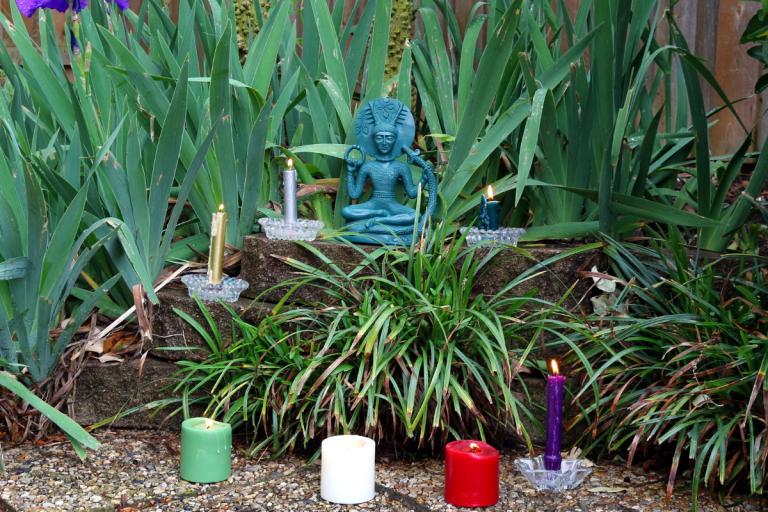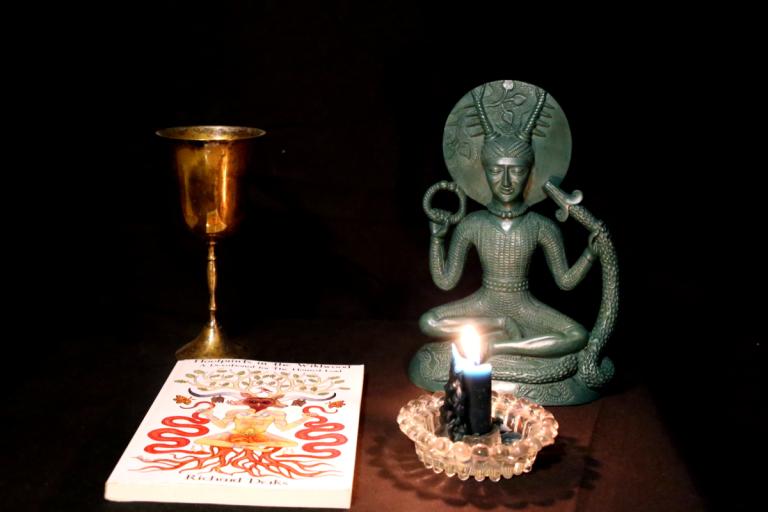If you’re going to lead or help lead a group ritual – especially if it’s a large public ritual – you need to be prepared. You need a solid plan for what you’re going to do and how you’re going to do it. For me, that means a detailed script. Even if your tradition has used the same liturgy for so long you could do it in your sleep, you still need a checklist to make sure you don’t forget any necessary tools or supplies.
But leading a good ritual requires more than making all the necessary logistical preparations. Leading a good ritual requires spiritual preparation.
Hopefully you’re already doing daily spiritual practice of some kind. There is no substitute for regular meditation, prayer, offerings, study, and the many spiritual practices that keep us connected to our traditions and to our Gods and other spiritual allies. But none of us are leading Beltane or Summer Solstice rituals every week. We need spiritual preparations for them as well.
For last Saturday’s Cernunnos Ritual, everyone with a scripted part (speaking or non-speaking) participated in six nights of preparation. I’ve found six nights is an ideal number. That lets us start on Sunday night, when the weekend is over and thoughts of the coming week begin. It ends the following Friday night, with the ritual coming the next day. The first time we did this (for Summer Solstice 2004) we did nine nights, one for each of the Gods of the Egyptian Ennead. Pick the length that fits what you’re doing.

Build a foundation
What’s the focus of your ritual? Devotion to a deity? This is a good time to learn what you can about Them. A seasonal celebration? Find out how your ancestors celebrated this occasion, and how other Pagans are celebrating it today. A rite of passage? Learn about transitions and liminal periods; read about Masonic initiations or the Eleusinian Mysteries.
This research and study will provide the context you need to understand your ritual at a deep, spiritual level.
Strengthen your connections
If you were going to hold a ceremony to honor a community leader, you’d want to talk to them, hear their stories, and get to know them. That would help you know how to present them to an unfamiliar audience, and how to do it in a way that would be respectful to your guest of honor.
I’m a sworn priest of Cernunnos – I pray to Him every night. But I still got a boost out of adding six nights of special prayers and meditations on top of my normal routine. Several of those who aren’t so familiar with Him said that the preparations really helped them understand who and what He is.
If you’re doing an ancestor ritual, connect with your ancestors. If you’re doing a ritual to honor Nature or to protect Nature, connect with the spirits of the land. Strengthen your connections to your spiritual allies.
Open yourself to service
The first rule of leading public ritual is that it’s not about you. It’s about honoring the Gods and spirits, and it’s about facilitating an experience for everyone in attendance. That takes work.
If you’re going to facilitate an experience of a deity, you have to be willing to let that deity speak through you. Not necessarily through ecstatic possession (though that’s one way) – more frequently it’s through Them telling you what They want you do say and do, and then you doing it.
“It’s not about you” means the purpose of ritual isn’t to make you look important or powerful. At the same time, don’t downplay what you do well. Put your skills to work where they can do the most good.
Read
Each night’s spiritual preparation begins with a reading. These can be educational or devotional. For our Cernunnos Ritual, we used a blog post on what is known about Cernunnos, a recap of our 2013 Cernunnos ritual, and a post on the environment in which we work. We also used a personal account of someone’s experience of Him, a poem, and a video of a song dedicated to Him. The longest took about ten minutes to read – most took three or four. Length is less important than impact.
Make invocations and offerings
After your reading, make invocations and offerings to the Gods or spirits you’re honoring. You may want to use the prayers you’re planning to use in the ritual. You may come across something appropriate in your reading. This is a great time to revive ancient prayers, where they exist (easy for the Gods of Egypt – much harder for the Gods of Ireland). Or you may want to use extemporaneous prayers.
Conclude your prayers with an appropriate offering. Do a bit of research to find something appropriate – show Them it matters to you. This is a time for sacrifice – for putting more time and money into an offering than you normally would. But if you simply cannot offer a special food or drink or song, offer what you have.
Listen
Stand or sit quietly and listen. This isn’t the time for Buddhist-style breath-focused meditation. You’re not trying to empty your mind – you’re trying hear what’s going on around you.
Close your eyes and listen with your physical ears. What do you hear? The usual background noise? The wind in the trees? Perhaps an unusual bird? Listen.
Then listen with your other ears. Have your offerings been accepted? Does the God, ancestor, or spirit you invoked have something to tell you? Maybe something they want you to do? Perhaps someone you weren’t expecting has something to say? Listen.
Give thanks
Be grateful for whatever you’ve received, even if it’s only the opportunity to pray and make offerings in peace. If you’ve received more, the best thanks is to make good use of what the Gods have given you.
How long should all this take? That depends on what you’re trying to do, but in general I’d say each evening’s work should take more than five minutes but less than thirty.
I can hear some of my polytheist friends laughing – their preparations take hours and hours… sometimes days and days. Perhaps someday yours will too. But don’t let that scare you off. Start here, with a week’s worth of special devotions.
I’ve been leading public rituals for a while now. I love doing it and it still hasn’t gotten old. But I have to admit: sometimes I get busy and feel like “let’s just do this” – particularly if I’m not the ritual coordinator and I have a smaller part. That’s not a good thing.
If a ritual is worth doing, it’s worth putting the time and effort into planning something pleasing to our Guests of Honor, whether those guests are Gods, ancestors, or spirits of Nature. It’s also worth putting an appropriate amount of time into spiritual preparation, so we can be ready to facilitate a religious experience for everyone in attendance.

















